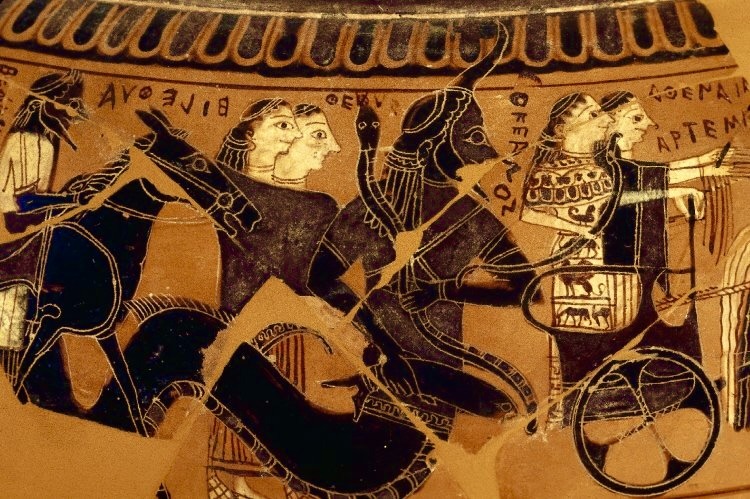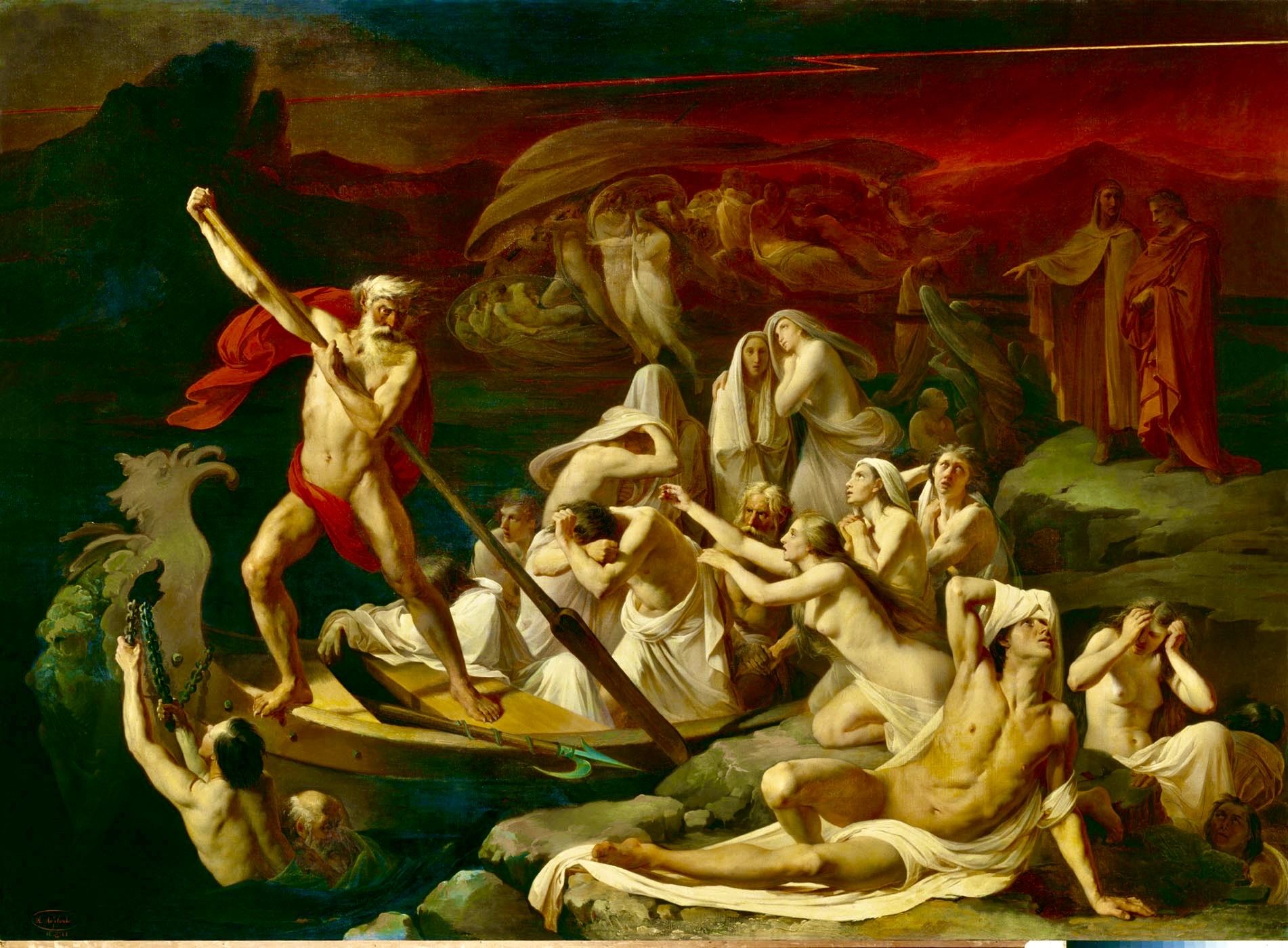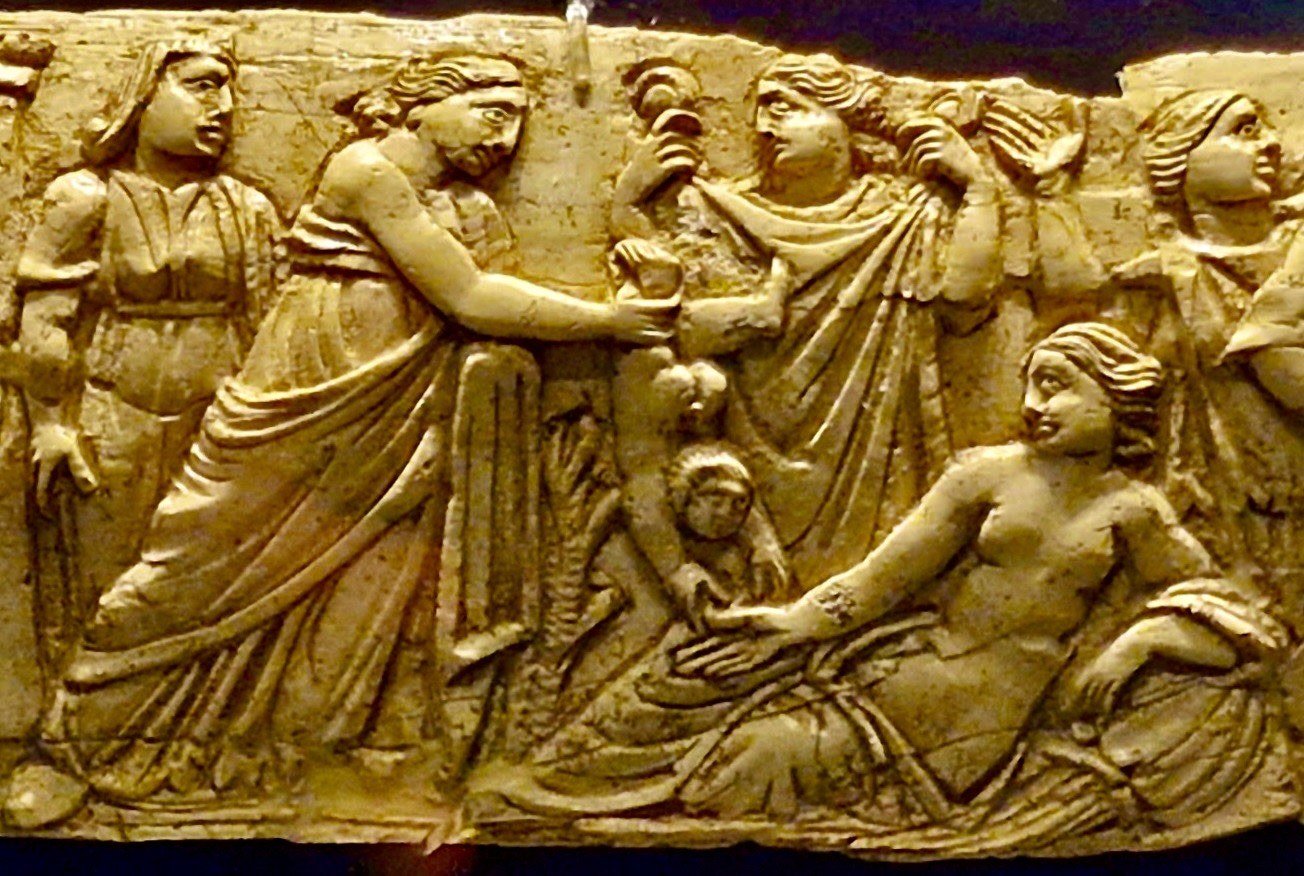The sacred water world of the ancient Greeks

Poseidon, brother of Zeus, god of the seas, earthquakes and horses. Detail, side A from an Attic red-figured calyx-krater, first half of the 5th century BCE. From Agrigento, Magna Graecia. Photo: Marie-Lan Nguyen. Wikipedia Commons
The Greeks had several water gods that reigned over the oceans, seas, rivers and land, including Amphitrite, Poseidon, Proteus, Nereus, Tethys, Okeanos, Thetis, Phorkys, Triton and Pontos. The most important of these divinities was Okeanos, source of life for both gods and humans.

Athenian, black-figure Dinos by Sophilos, c. 590 BCE (London, British Museum. Detail from a depiction of the Wedding of Peleus and Thetis, attended by several gods in chariots. Behind Athena and Artemis in the last chariot, Thetis’ grandfather, the fish-tailed sea-god Okeanos, his wife Tethys, and Eileithyia, goddess of childbirth, follow the procession. Wikipedia Commons
River gods were also important. The most ancient was River Styx, sacred to gods and Greeks. Its realm was in the underworld and groundwater of Arcadia, Peloponnesos. The gods took oaths at River Styx, which was also a goddess. River Styx connected the living and the dead. It was flowing at the entrance to Hades, the underworld for the souls of the dead. The ferryman, Charon, put the souls of the dead in his boat and sailed them to Hades.

Charon by Alexander Lytovchenko, 1861. Russian Museum, St. Petersburg. Public Domain
We know that the water goddess Thetis dipped her baby son Achilles into the sacred waters of the River Styx in order to make her son immortal.

Thetis dips baby Achilles into the waters of goddess / River Styx. Achilles became the Greek superhero in the Trojan War. Alexander the Great imitated him. Museum of Eleutherna, Crete, Greece. Photo: Rigorios. Wikipedia Commons.
Styx (Στύξ, shuddering) was the daughter of the Titans Okeanos and Tethys. Styx married the Titan Pallas and gave birth to Bia / violence, Nike / victory, Kratos / power, and Zelos / glory. Ancient poets and historians like Homer, Hesiod, Herodotos, Plutarch and Pausanias spoke about River Styx.
Homer describes the Styx as the fearful-oath river (Iliad 2.755). Hesiod described the waters of Styx as primeval and immortal. He said the gods who take oaths at those waters will pay a fearful price if they swear false oaths (Theogony 775-806). Several centuries after Homer and Hesiod, the historian Herodotos speaks of the Styx as a stream in the Arcadian polis of Nonakris (Histories 6.74).
It’s possible River Styx, or whatever survived during its millennia life, may be the modern Arcadian River Mavroneri (Blackwater River) flowing into River Krathis near Mt. Chelmos.
Other important water deities included Okeanos and Poseidon and Pontos. We mentioned Okeanos. He covered all the water realm of the Greek Cosmos. Okeanos was the nursery of the gods. It circled the Gaia / Ge / Earth. Pontos was the seas. Poseidon, with whom I started this essay, was the king of the oceans and seas. Homer calls him enosichthon (ἐνοσίχθων), that is, the Earthshaker (Iliad 15.205). He was also the god that favored horses.

Poseidon on a sea chariot. Silver coin issued by Peter the Great, 1612-1725. Courtesy Numismatic Museum, Athens.
Water in philosophy, cosmology, agriculture
Water was more than the realm of the gods. Philosophers and scientists and farmers the Greek world over grasped its significance and life-supporting virtues.
The first natural philosopher of the Greeks was Thales, born in Miletos around 625 BCE. Miletos was an Ionian polis in Asia Minor or Ionia. Aristotle reveals (in his Metaphysics 1.3 983b18-27) that Thales thought that water was the primordial principle or being that existed in everything, and that the Earth rests on water.
But water was the stuff of life for all Greeks. Xenophon, student of Socrates, a general, and author of Hellenika, in which he completed the history of the Peloponnesian War, also wrote a book on farming in which water was life. He praised agriculture for promoting and teaching political freedom, food security, pleasure, cooperation and civilization (Oikonomikos 5.6-14; 19.17-19).
After the ancient Greeks
In modern times, water is still life but few if any philosophers, scientists or politicians consider it more than a “commodity” or a combination of two molecules of hydrogen and one of oxygen – H2O. Economists and the public think of water for quenching their thirst and for growing food and watering their lawns. These ideas and misleading understanding of water is also the orthodoxy in Greece. Mythological, philosophical and historical understandings of water have dried up. Foreign ideas have expelled or concealed the ancient Greek civilization. Modern Greece is still connected to her ancient traditions, but the exigencies of modern times cover up the ancient marvel of science, philosophy, and beautiful culture.
Droughts and overtourism
If we restrict our observations to the twenty-first century, we face a perpetual crisis not merely in Greece, but the world over. Having learnt almost nothing from the near fatal errors of the twentieth century, the “great powers” (US, Russia, China, India, and the European Union) continue to arm themselves to the teeth, while ignoring the anthropogenic climate chaos and the collapsing ecological integrity and health of the planet. In this context of worldwide pollution, water is diminishing in quality. It has become just a “resource.”
In Greece, even this resource is disappearing. “Dozens of drought stricken Greek islands in the Aegean,” reports the Climate Change Post, “are being forced to import greater amounts of water every year.” The islands suffering from water scarcity include the following Aegen islands: Milos, Nisyros, Amorgos, Koufonisia, Shinoussa, Tinos, Sikinos, Patmos, and Syme.
Scarce rainfall has exacerbated the use and misuse of aquifers that are probably more than 70 percent empty. The government in Athens promises the islands more imported water and even desalination of sea water, but, in most cases, it does not deliver.
In 2024, reporters observed the situation of water was “particularly alarming on the Greek islands, many of which do not have the infrastructure to absorb tens of thousands of tourists…. Some islands are feeling the crush… Sifnos [in southern Aegean[, for example, received [in 2024] more than 100,000 tourists, up from 67,000 in 2014. Sifnos, along with islands like Crete [in southern Aegean], Kefalonia [in the Ionian Sea], Leros and Serifos [in the southern Aegean], declared a state of emergency this summer [of 2024] after wells and reservoirs dried up, leaving residents dependent on desalination units, which are expensive to obtain and run.”
Disappearing water
In Crete, about 65 percent of the total water comes from aquifers and the remaining 35 percent from winter springs and streams. Some 80 percent of this water goes for the irrigation of less than 30 percent of the cultivated land. Exactly like California. Add overtourism and the result is dramatic water crises — all over Greece.
Argolida in Peloponnesos is a rich agricultural region of Greece. It relies on flowing water. Yet its water infrastructure is falling apart, disrupting the flow of water to both farmers and city folk. In the town of Ermioni, for example, a recent report shows that a small number of people — about 8 percent – receive safe drinking water. The irrigation canal seems to have cracks. Moreover, buried pipes lose “more than half the water that is pumped through them.” During the summer “officials advise… residents not to drink the contaminated brackish water that is pumped from backup sources into their homes… Greece loses around half its drinking water from leaky pipes and theft.”
Meanwhile, the European Union is planning to spend “hundreds of billions of euros” for better water security at a time climate change is intensifying droughts and temperature.
In the case of Greece, these crises are like additional hurricanes that impoverished the country through crippling and humiliating debt austerity, especially from 2009 to 2018. The EU and America’s International Monetary Fund supervised that destructive debt attack against Greece.
Overtourism
In general, observers say, “Water scarcity is becoming the next battleground in overtourism. People in Spain, Morocco, and Sicily, Italy, “compete with tourists to get their share of the dwindling supply. Fearful of deterring visitors, governments dependent on tourism dollars are reluctant to impose restrictions on hotels and restaurants.”
According to CNN: Krontiras, mayor of the Aegean island of Tinos, is concerned about “the boom in swimming pools in Tinos and elsewhere.” Given the water crisis, he said, “we need the state to maybe start viewing differently the need for swimming pools to exist on the islands.”
Conclusion
For millennia, water was one of the four elements that made up everything, including life. Water was life herself. The Greeks dressed it with fantastic mythology, philosophy, theology, hydrology (from ύδωρ, water), history and agricultural ecology. These ideas kept society healthy, well-fed, and sustainable. Farming made Greece free and democratic. It built its citizen soldiers and political independence.
Greece in the twenty-first century, some 5,000 years after its beginnings of civilized life, needs to look back in order to move forward. Enough with the transformation of Greek civilization and Greece into a factory of tainted food and a hotel for foreigners.
Tourists are important. They are invisibly Philhellenes but need guidance to express their love for Greece. The Greek state must find ways to avoid the drastic negative effects of overtourism without offending the visitors who can become ambassadors for Greece. Draw on the ancient Hellenic practices and wisdom of raising food and taking care of animals and the natural world. Such inspirations could help Greece to fight climate chaos and advance a new civilization without fossil fuels.
Water matters. It’s the liquid of life for humans and animals and plants and the glue that keeps the land fertile and, in rivers, seas, and oceans, the home for myriad of fish and other wildlife. We must return to the ancient Greek views and treatment of this divine form of life.
The post Water in Greek Society appeared first on CounterPunch.org.
This post was originally published on CounterPunch.org.